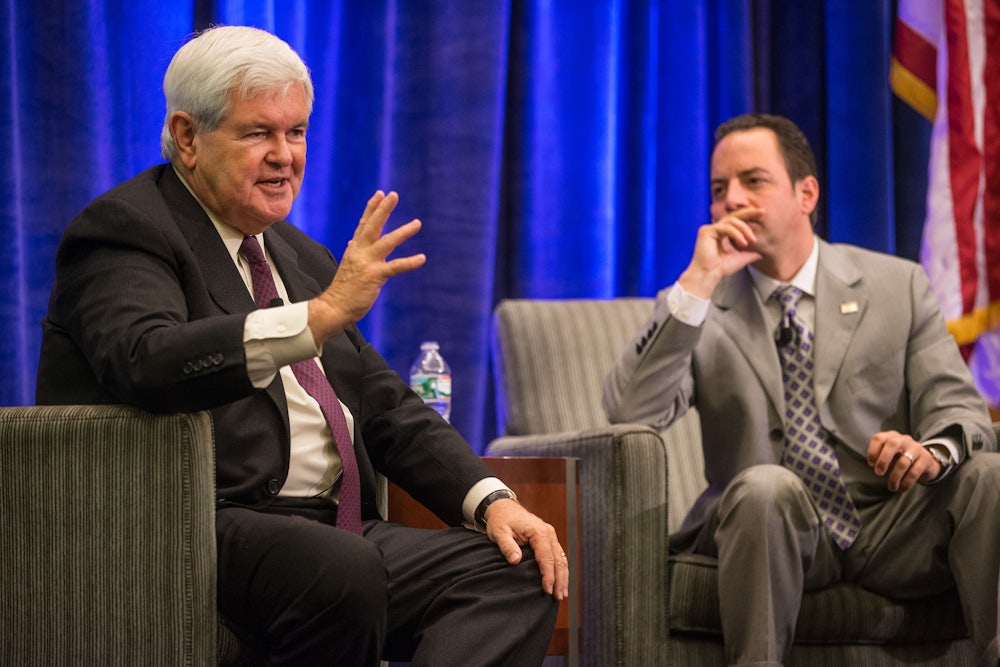The push notifications lit up their phones with horrifying news—the city of Tehran, destroyed by an American nuclear weapon—and they knew immediately what they had to do.
It was time for another intervention.
As President Donald Trump’s most trusted and only advisers, they had become accustomed to this. From the moment he’d accepted the Republican Party’s presidential nomination one year prior, they’d been called upon to carry out the same ritual every 10 to 14 days, first to end his petty feud with Gold Star families, more recently to end his petty feuds with hostile countries. Now, in the sixth month of his presidency, after more than 30 such interventions, they were frankly growing weary of it. Early on, Trump’s children had been key liaisons, helping to quarantine their father, take custody of his smartphone, and hypnotize him with video footage from his campaign rallies played on loop.
But shortly after his presidency began—after he refused to make a timely debt payment to China, before he began carrying the nuclear football around like a briefcase—Eric, Ivanka, and Donald Jr. had severed ties with their father and changed their surnames from Trump to the somewhat-less-mortifying “Santorum.” They called it “rebranding.”
It had been up to the same small crew to “contain” or “manage” Trump ever since. And it was formulaic by now: At the end of each workday, as the commander-in-chief settled in for a pre-slumber marathon of shouting at cable news and Celebrity Apprentice reruns, Newt Gingrich, Rudy Giuliani, and Reince Priebus would gather around a table in the old executive office building, each nursing his own bowl of cereal and bottle of Baileys. Here they’d count down the hours before Trump fell asleep, in the hope that another intervention wouldn’t be necessary.
Several times on the campaign trail, Newt had convinced himself he’d discovered a way to predict Trump’s meltdowns and stage preemptory interventions. At one point, encouraged by a large body of literature suggesting house pets can sense oncoming disasters as diverse as earthquakes and tumor-formation, he’d gone so far as to keep a pack of domesticated dogs within sniffing distance of Trump for the entirety of the general-election campaign, hoping they would react strangely when they detected an imminent new eruption. Instead, the dogs behaved the way animals that come within 100 feet of Trump have always reacted—first in fear, then violently in fits of self-preservation. This unusual phenomenon had followed Trump around and perplexed him since he was a young boy.
Newt still kicks himself a little for that; he really should have known. Rumor had it that he was a lock to replace Mike Pence as running mate until the fateful day when two of the leashes slipped from his grasp and the dogs made a beeline for Trump’s jugular.
Those were the good old days, though, when the international crises Trump stumbled into were mostly theoretical. Now Newt and his fellow advisers had another intervention to stage. This one would be more serious than most—nuking a Persian Gulf metropolis was no tiny thing. Reince was miffed. Rudy was concerned about Trump’s legacy, but slightly aroused by the thought of the carnage on the ground in Iran. Newt had been dipping back into Cicero and Norman Vincent Peale, convinced he’d found the elixir for talking the president down.
As they waited nervously for Trump to descend, they knew by now how it would go down: He would confuse the country he’d just committed an act of war against for a different country, which doesn’t actually exist. They’d gingerly point out that Syriana is actually a fictional setting from the eponymous George Clooney film, and he’d lash out at them for having the temerity to correct him, leaving Reince in yet another puddle of tears. But they took solace, as always, in the fact that no matter what Trump did, no matter how recklessly he behaved, no matter how many jobs or lives he sent up in smoke, they could just tell the press that an intervention was in the works—a few of them had actually worked, after all—and everything would return to normal again.
